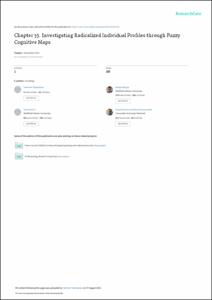Please use this identifier to cite or link to this item:
http://localhost/handle/Hannan/4796
| Title: | Investigating Radicalized Individual Profiles through Fuzzy Cognitive Maps |
| Authors: | Babak Akhgar;Fahimeh Tabatabayi;Petra Saskia Bayerl;Samir M.R. Nasserzadeh;Andrew Staniforth |
| Year: | 2013 |
| Abstract: | The openness and freedom of the Internet unfortunately supports “self-radicalization,” that is, the radicalization of individuals without direct input or encouragement from others. The role of the Internet in both radicalization and the recruitment into terrorist organizations has therefore become a growing source of concern. The Internet allows individuals to find people with shared views and values and to access information to support their radical beliefs and ideas. The unregulated and ungoverned expanse of the Internet knows no geographical boundaries, thus creating a space for radical activists to connect across the globe. This is especially problematic as the easy access to like-minded people helps to normalize radical ideas such as the use of violence to solve problems [1,2]. Yet, solving the issue of radicalization by simple processes (e.g., the suggestion of “cleaning up” the Internet) is impossible [3]. Part of the problem is that claims that terrible things are happening on extremist websites and in Internet chat-rooms are difficult to verify [1,4]. Consequently, many of the current policy proposals to address this security challenge are either unrelated to the issue or lack a sound empirical basis. We argue that this requires an alternative and more comprehensive approach that takes the complex nature of the problem into account and that can be integrated into any policy aimed at tackling online radicalization. |
| URI: | http://localhost/handle/Hannan/4796 |
| Appears in Collections: | مدیریت پروژه و ساخت |
Files in This Item:
| File | Description | Size | Format | |
|---|---|---|---|---|
| 195.pdf | 883.33 kB | Adobe PDF |  Preview File |
| Title: | Investigating Radicalized Individual Profiles through Fuzzy Cognitive Maps |
| Authors: | Babak Akhgar;Fahimeh Tabatabayi;Petra Saskia Bayerl;Samir M.R. Nasserzadeh;Andrew Staniforth |
| Year: | 2013 |
| Abstract: | The openness and freedom of the Internet unfortunately supports “self-radicalization,” that is, the radicalization of individuals without direct input or encouragement from others. The role of the Internet in both radicalization and the recruitment into terrorist organizations has therefore become a growing source of concern. The Internet allows individuals to find people with shared views and values and to access information to support their radical beliefs and ideas. The unregulated and ungoverned expanse of the Internet knows no geographical boundaries, thus creating a space for radical activists to connect across the globe. This is especially problematic as the easy access to like-minded people helps to normalize radical ideas such as the use of violence to solve problems [1,2]. Yet, solving the issue of radicalization by simple processes (e.g., the suggestion of “cleaning up” the Internet) is impossible [3]. Part of the problem is that claims that terrible things are happening on extremist websites and in Internet chat-rooms are difficult to verify [1,4]. Consequently, many of the current policy proposals to address this security challenge are either unrelated to the issue or lack a sound empirical basis. We argue that this requires an alternative and more comprehensive approach that takes the complex nature of the problem into account and that can be integrated into any policy aimed at tackling online radicalization. |
| URI: | http://localhost/handle/Hannan/4796 |
| Appears in Collections: | مدیریت پروژه و ساخت |
Files in This Item:
| File | Description | Size | Format | |
|---|---|---|---|---|
| 195.pdf | 883.33 kB | Adobe PDF |  Preview File |
| Title: | Investigating Radicalized Individual Profiles through Fuzzy Cognitive Maps |
| Authors: | Babak Akhgar;Fahimeh Tabatabayi;Petra Saskia Bayerl;Samir M.R. Nasserzadeh;Andrew Staniforth |
| Year: | 2013 |
| Abstract: | The openness and freedom of the Internet unfortunately supports “self-radicalization,” that is, the radicalization of individuals without direct input or encouragement from others. The role of the Internet in both radicalization and the recruitment into terrorist organizations has therefore become a growing source of concern. The Internet allows individuals to find people with shared views and values and to access information to support their radical beliefs and ideas. The unregulated and ungoverned expanse of the Internet knows no geographical boundaries, thus creating a space for radical activists to connect across the globe. This is especially problematic as the easy access to like-minded people helps to normalize radical ideas such as the use of violence to solve problems [1,2]. Yet, solving the issue of radicalization by simple processes (e.g., the suggestion of “cleaning up” the Internet) is impossible [3]. Part of the problem is that claims that terrible things are happening on extremist websites and in Internet chat-rooms are difficult to verify [1,4]. Consequently, many of the current policy proposals to address this security challenge are either unrelated to the issue or lack a sound empirical basis. We argue that this requires an alternative and more comprehensive approach that takes the complex nature of the problem into account and that can be integrated into any policy aimed at tackling online radicalization. |
| URI: | http://localhost/handle/Hannan/4796 |
| Appears in Collections: | مدیریت پروژه و ساخت |
Files in This Item:
| File | Description | Size | Format | |
|---|---|---|---|---|
| 195.pdf | 883.33 kB | Adobe PDF |  Preview File |
